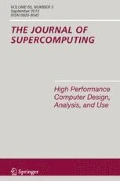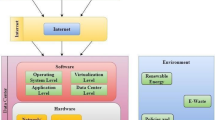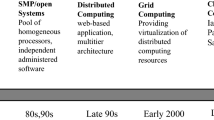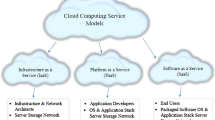Abstract
Mobile cloud computing is a form of cloud computing that incorporates mobile devices such as smartphones and tablet PCs into the cloud infrastructure. As mobile devices are resource-constrained in nature, new scheduling strategies are required when using them as resource providers. Based on our previous group-based scheduling algorithm, we present fault-tolerant scheduling algorithms considering checkpoint and replication mechanisms to actively cope with faults. We carried out the performance evaluation with simulation to demonstrate that our algorithm is more efficient than the existing one lacking fault tolerance in terms of accuracy rate, resource consumption, and average execution time. In particular, the average execution time was reduced by about 60%, resulting in the reduction of resource consumption.







Similar content being viewed by others
References
Abd SK, Al-Haddad S, Hashim F, Abdullah AB, Yussof S (2017) Energy-aware fault tolerant task offloading of mobile cloud computing. In: 2017 5th IEEE International Conference on Mobile Cloud Computing, Services, and Engineering (MobileCloud). IEEE, pp 161–164
Casanova H, Giersch A, Legrand A, Quinson M, Suter F (2014) Versatile, scalable, and accurate simulation of distributed applications and platforms. J Parallel Distrib Comput 74(10):2899–2917
Chantrapornchai C, Nusawat P (2016) Two machine learning models for mobile phone battery discharge rate prediction based on usage patterns. J Inf Process Syst 12(3):436–454
Chen CA, Won M, Stoleru R, Xie GG (2015) Energy-efficient fault-tolerant data storage and processing in mobile cloud. IEEE Trans Cloud Comput 3(1):28–41
Chen G, Kang BT, Kandemir M, Vijaykrishnan N, Irwin MJ, Chandramouli R (2004) Studying energy trade offs in offloading computation/compilation in java-enabled mobile devices. IEEE Trans Parallel Distrib Syst 15(9):795–809
Choi S, Chung K, Yu H (2014) Fault tolerance and QoS scheduling using CAN in mobile social cloud computing. Cluster Comput 17(3):911–926
Chun BG, Maniatis P (2010) Dynamically partitioning applications between weak devices and clouds. In: Proceedings of the 1st ACM Workshop on Mobile Cloud Computing & Services: Social Networks and Beyond. ACM, p 7
Chunlin L, Xin Y, Yang Z, Youlong L (2017) Multiple context based service scheduling for balancing cost and benefits of mobile users and cloud datacenter supplier in mobile cloud. Comput Netw 122:138–152
Cuervo E, Balasubramanian A, Cho Dk, Wolman A, Saroiu S, Chandra R, Bahl P (2010) MAUI: making smartphones last longer with code offload. In: Proceedings of the 8th International Conference on Mobile Systems, Applications, and Services. ACM, pp 49–62
Deng S, Huang L, Taheri J, Zomaya AY (2015) Computation offloading for service workflow in mobile cloud computing. IEEE Trans Parallel Distrib Syst 26(12):3317–3329
Dinh HT, Lee C, Niyato D, Wang P (2013) A survey of mobile cloud computing: architecture, applications, and approaches. Wirel Commun Mobile Comput 13(18):1587–1611
Fayçal-Khelfi M et al (2016) Using mobile data collectors to enhance energy efficiency and reliability in delay tolerant wireless sensor networks. J Inf Process Syst 12(2):275–294
Gelenbe E (1979) On the optimum checkpoint interval. J ACM (JACM) 26(2):259–270
George J, Chen CA, Stoleru R, Xie G (2016) Hadoop mapreduce for mobile clouds. IEEE Trans Cloud Comput. https://doi.org/10.1109/TCC.2016.2603474
Goyal M, Saini P (2016) A fault-tolerant energy-efficient computational offloading approach with minimal energy and response time in mobile cloud computing. In: 2016 Fourth International Conference on Parallel, Distributed and Grid Computing (PDGC). IEEE, pp 44–49
Hao F, Pei Z, Park DS, Phonexay V, Seo HS (2018) Mobile cloud services recommendation: a soft set-based approach. J Ambient Intell Humaniz Comput 9(4):1235–1243
Henderson T, Kotz D (2007) Crawdad trace \(dartmouth/campus/syslog/05\_06\) (v. 2007-02-08)
Huchton S, Xie G, Beverly R (2011) Building and evaluating a k-resilient mobile distributed file system resistant to device compromise. In: Military Communications Conference, 2011-MILCOM 2011. IEEE, pp 1315–1320
Jackson KR, Ramakrishnan L, Muriki K, Canon S, Cholia S, Shalf J, Wasserman HJ, Wright NJ (2010) Performance analysis of high performance computing applications on the amazon web services cloud. In: 2010 IEEE Second International Conference on Cloud Computing Technology and Science (CloudCom). IEEE, pp 159–168
Jeong H, Kim DH, Baddar WJ, Ro YM (2017) Gender classification system based on deep learning in low power embedded board. KIPS Trans Softw Data Eng 6(1):37–44
Kim D (2017) Cloud computing to improve javascript processing efficiency of mobile applications. J Inf Process Syst 13(4):731–751
Kim HW, Jeong YS (2018) Secure authentication-management human-centric scheme for trusting personal resource information on mobile cloud computing with blockchain. Hum Centric Comput Inf Sci 8(1):11
Lee J, Choi S, Gil J, Suh T, Yu H (2014) A scheduling algorithm with dynamic properties in mobile grid. Front Comput Sci 8(5):847–857
Lee J, Choi S, Suh T, Gil J, Shi W, Yu H (2012) A mobile device group based fault tolerance scheduling algorithm in mobile grid. In: Park J, Jeong YS, Park S, Chen HC (eds) Embedded and multimedia computing technology and service. Springer, Dordrecht, pp 485–492
Lee J, Choi S, Suh T, Yu H (2014) Mobility-aware balanced scheduling algorithm in mobile grid based on mobile agent. Knowl Eng Rev 29(4):409–432
Lee J, Choi S, Suh T, Yu H, Gil J (2010) Group-based scheduling algorithm for fault tolerance in mobile grid. In: Security-Enriched Urban Computing and Smart Grid, pp 394–403
Lee JH, Choi S, Lim J, Suh T, Gil JM, Yu HC (2010) Mobile grid system based on mobile agent. In: FGIT-GDC/CA. Springer, pp 117–126
Ling Y, Mi J, Lin X (2001) A variational calculus approach to optimal checkpoint placement. IEEE Trans Comput 50(7):699–708
Mell PM, Grance T (2011) The NIST definition of cloud computing. NIST Special Publication, Report Number 800–145. https://doi.org/10.6028/NIST.SP.800-145
Mesbahi MR, Rahmani AM, Hosseinzadeh M (2018) Reliability and high availability in cloud computing environments: a reference roadmap. Hum Centric Comput Inf Sci 8(1):20
Moon Y, Yu H, Gil JM, Lim J (2017) A slave ants based ant colony optimization algorithm for task scheduling in cloud computing environments. Hum Centric Comput Inf Sci 7(1):28
O'Sullivan MJ, Grigoras D (2016) Context aware mobile cloud services: a user experience oriented middleware for mobile cloud computing. In: 2016 4th IEEE International Conference on Mobile Cloud Computing, Services, and Engineering (MobileCloud). IEEE, pp 67–72
Ou S, Yang K, Liotta A, Hu L (2007) Performance analysis of offloading systems in mobile wireless environments. In: IEEE International Conference on Communications, 2007. ICC’07. IEEE, pp 1821–1826
Ren X, Eigenmann R, Bagchi S (2007) Failure-aware checkpointing in fine-grained cycle sharing systems. In: Proceedings of the 16th International Symposium on High Performance Distributed Computing. ACM, pp 33–42
Rinne H (2008) The Weibull distribution: a handbook. Chapman and Hall/CRC, Boca Raton
Satyanarayanan M, Bahl P, Caceres R, Davies N (2009) The case for VM-based cloudlets in mobile computing. IEEE Pervasive Comput 8(4):14–23
Shi W, Cao J, Zhang Q, Li Y, Xu L (2016) Edge computing: vision and challenges. IEEE Internet Things J 3(5):637–646
Zhou Z, Zhang H, Ye L, Du X (2016) Cuckoo: flexible compute-intensive task offloading in mobile cloud computing. Wirel Commun Mobile Comput 16(18):3256–3268
Acknowledgements
This research was supported by Basic Science Research Program through the National Research Foundation of Korea (NRF) funded by the Ministry of Education (NRF-2014R1A1A2055463).
Author information
Authors and Affiliations
Corresponding author
Rights and permissions
About this article
Cite this article
Lee, J., Gil, J. Adaptive fault-tolerant scheduling strategies for mobile cloud computing. J Supercomput 75, 4472–4488 (2019). https://doi.org/10.1007/s11227-019-02745-5
Published:
Issue Date:
DOI: https://doi.org/10.1007/s11227-019-02745-5




